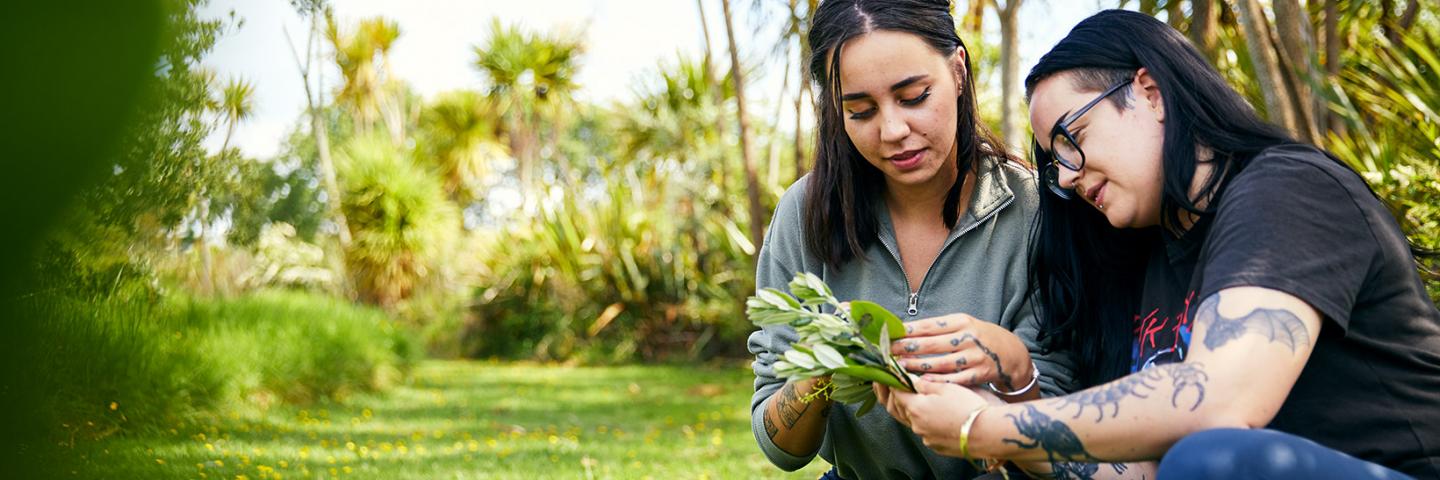Programme overview
The world is facing two major environmental issues – climate change and biodiversity loss. To tackle these specific issues in Aotearoa, New Zealand, the government is backing local and national initiatives – and they require biodiversity professionals with applied knowledge and field experience to lead the way.
Benefits of the Postgraduate Diploma in Applied Science programme:
- It’s a one-year qualification that mixes online and on-campus learning
- It introduces you to the world of research with more guidance than a full master’s programme – offering an easy way for working professionals to start postgraduate study.
- There’s plenty of flexibility. You can dive in and study full-time or take one course over a semester – whatever works for you, your lifestyle, and your current work commitments.
When you graduate, you’ll be able to:
- Apply advanced technical knowledge and skills. Critically evaluate advanced knowledge in applied science, including recognised industry methodologies, data analysis, and effective problem-solving skills to investigate issues arising from the human impact on the environment.
- Adapt to diverse working environments, communicate, and collaborate in various applied science working environments to develop and maintain relationships with multiple stakeholders, including government, Māori, and local communities,
- Summarise advanced and new knowledge, insight, and innovation to improve practice in applied science for industry and community stakeholders
- Contribute to improved practice and sustainability through critical analysis and problem-solving to advance innovative practices in environmental sustainability in business, government, and non-governmental sectors.
- Act as an ethical guardian of global biodiversity, applying cross-cultural perspectives that embrace understanding and engagement with indigenous bodies of knowledge, practices, and worldviews with a critical focus on Te Ao Māori and Te Tiriti o Waitangi in an applied science context.
Highlights
Earn and learn: This programme mixes on-campus and online learning, making it an excellent option for biodiversity professionals who are already working and want to start postgraduate study.
Move your career up a level: With a postgraduate qualification, you’ll acquire higher-level knowledge and develop the necessary skills for your specialisation, strengthening your CV and increasing the likelihood of a higher salary.
Dip your toes into research: Complete a small industry or community-linked dissertation with the help of a project mentor.
Key focus on Te Ao Māori and Te Tiriti o Waitangi: Put cross-cultural perspectives that embrace understanding and engagement with indigenous bodies of knowledge, techniques, and worldviews into practice.
Spotlight on partnership and stakeholder engagement: Strengthen your relationship-building and collaboration skills to work professionally with Mana Whenua (Aotearoa NZ) and other stakeholders to drive the best outcomes for our land and people.
Access state-of-the-art facilities (local and national): In on-campus teaching opportunities you will learn in various facilities, including research and computer labs, marae, herbaria, and simulators, with access to specialist equipment and machinery.
Learn from experts across the country: This Diploma programme is supported by highly qualified and respected scientists and industry consultants from around Aotearoa, New Zealand.
Transition into further postgraduate study: This programme cross-credits towards our Master of Applied Science (Biodiversity Management).
Scholarships and awards
At Unitec, we want to manaaki student success wherever we can, and scholarships are one of the ways we do that. We have scholarships that recognise the achievements and the challenges of dedicating yourself to learning, whether in vocational trade, at the undergraduate level, or at the master’s degree level and beyond. Check out the scholarships listed below. The filters under Award Types, Characteristics, and Status will help refine your search. If you have questions, please email our Scholarships team or book in with a Scholarships advisor.
Unitec’s learning facilities
Applied Molecular Solutions Lab
If you’re interested in the genetics of animals, plants, and fungi, this lab is fully equipped for DNA extraction and analysis.
Some fascinating research projects include DNA barcoding of possible biological control agents, bioremediation of contaminated soils, and molecular analysis of seabird diets.
GIS Laboratory
Where science meets tech, the GIS Laboratory has 40 workstations with industry-standard ArcGIS and associated software.
Using high-performance Graphics Processing Units on Virtual Device Interfaces with large 24-inch monitors, these computers can run realistic 3D modeling, spatial analysis, image rendering, and other computing-intensive tasks.
The Herbarium
With a collection of 11,500 scientifically preserved plants, fungi, lichens, and seaweeds, the Herbarium is where you’ll learn about plant specimen collection and preparation techniques.
The Herbarium supports essential research, including investigations into invasive and native plants and fungi and an active lichen research group’s studies.
There’s also the opportunity to assist with accessioning and curation as a volunteer.
Admission requirements
What you will need to study this programme.
Domestic students
International students
Courses and timetables
For more details on the courses including timetables, please click on the course names below.
Debug
| Courses | Credits | Aim |
|---|---|---|
| Partnership and Stakeholder Engagement(NSCI8001TP) | 15.0 credits (0.125 EFTS) | Learners in this course develop the knowledge, skills and cultural competencies to authentically engage with Maori, Moriori, indigenous peoples elsewhere in the world, and other stakeholders. They do this by exploring stakeholders’ cultures and value systems, critically evaluating their own values, creating and enacting a plan for engagement and reflecting on their experiences. |
| Partnership and Stakeholder Engagement(NSCI8001TP) | 15.0 credits (0.125 EFTS) | Learners in this course develop the knowledge, skills and cultural competencies to authentically engage with Maori, Moriori, indigenous peoples elsewhere in the world, and other stakeholders. They do this by exploring stakeholders’ cultures and value systems, critically evaluating their own values, creating and using a model for engagement, reflecting on their experiences, and creating an action plan for further professional development in applied science and biodiversity. |
| Applied Research Methods(NSCI8002TP) | 15.0 credits (0.125 EFTS) | The aim of this course is to build skills to undertake a hypothesis driven applied research project based on review of previous knowledge around the student’s chosen research topic. |

